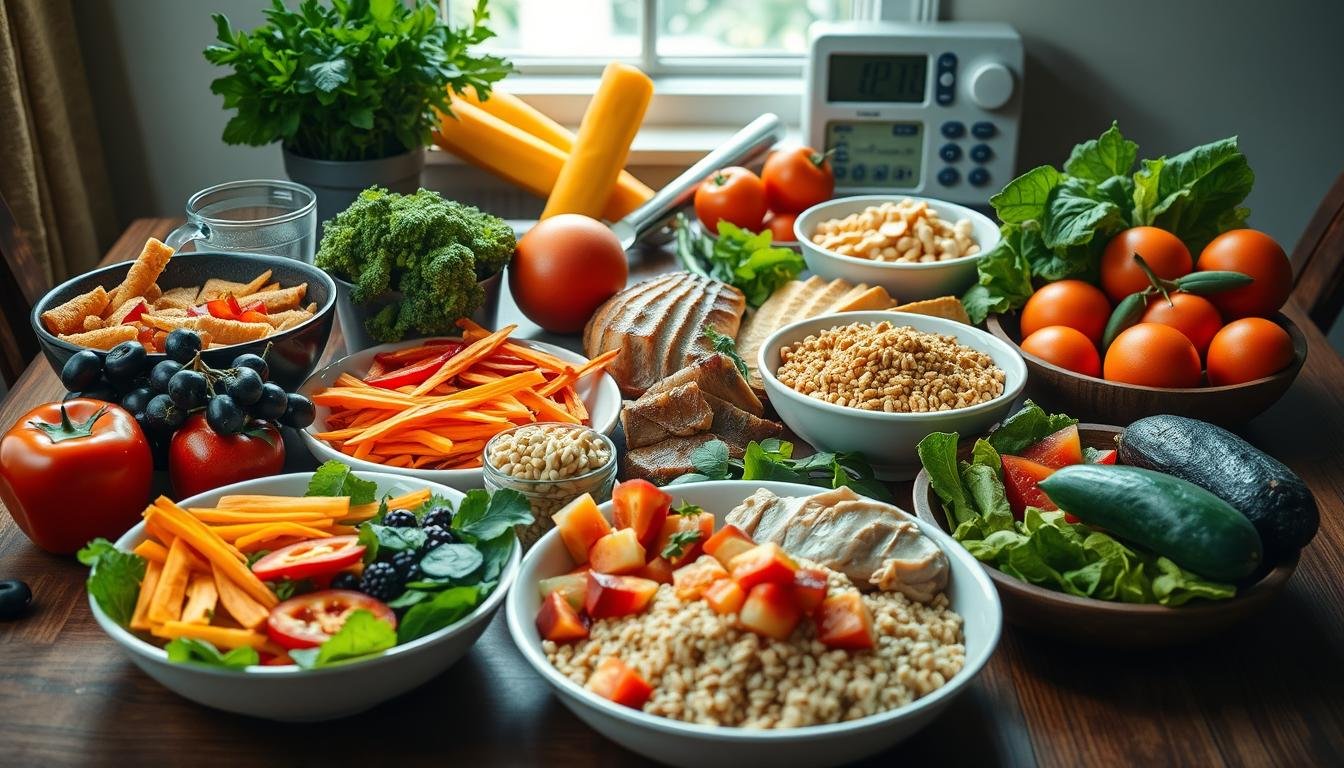Starting a healthier lifestyle is exciting but can also be tough. Finding the right balance is key to lasting success. A 1700 calorie meal plan can help you make healthy food choices that support your health and weight goals.
Imagine starting each day with a plan to support your wellness. A 1700 calorie diet gives your body the nutrients it needs while helping you lose weight slowly. You get to enjoy a variety of healthy foods without feeling too restricted.
A 1700 calorie meal plan includes three meals and two snacks a day. It provides about 99 grams of protein, 218 grams of carbs, and 57 grams of healthy fats. This ensures your body gets what it needs to function well and keeps you full all day. Eating a variety of fruits, veggies, whole grains, lean proteins, and healthy fats is key to nourishing your body.
Following a 1700 calorie diet isn’t about strict rules or cutting out foods. It’s about making smart choices that focus on whole, nutritious foods. Learning to control portions, eating mindfully, and drinking plenty of water will help you succeed on your healthy eating journey.
Key Takeaways
- A 1700 calorie meal plan promotes healthy weight management through balanced, nutrient-dense meals and snacks.
- The plan focuses on incorporating a variety of wholesome foods from all food groups, including fruits, vegetables, whole grains, lean proteins, and healthy fats.
- By following a 1700 calorie diet, you can create a modest calorie deficit that supports gradual, sustainable weight loss.
- Practicing portion control, mindful eating, and staying hydrated are key components of successfully adhering to a 1700 calorie meal plan.
- Embracing a balanced approach to healthy eating allows for flexibility and the occasional treat while still prioritizing overall nutrition and wellness.
Understanding the Basics of a 1700 Calorie Diet
A 1700 calorie diet is a balanced eating plan for weight management. It helps you understand your calorie needs and the right mix of nutrients. This approach makes healthy eating sustainable and effective.
Calorie Requirements for Weight Management
Adult females usually need 1,600 to 2,000 calories a day. Adult males need 2,000 to 2,400 calories. Your needs can change based on age, height, weight, and how active you are. For example, someone who weighs 160 pounds and wants to lose 1 pound a week needs about 1,420 calories a day.
Experts say losing more than 2 pounds a week is not healthy. A 1,700-calorie diet plan is a good start for healthy weight loss. It provides the right amount of nutrients while helping you lose weight.
Macronutrient Balance in a 1700 Calorie Diet
To get the most from a 1700 calorie diet, focus on the right mix of nutrients. Include foods from all groups to get enough carbs, healthy fats, and protein.
| Macronutrient | Percentage of Total Calories | Calorie Range | Gram Range |
|---|---|---|---|
| Carbohydrates | 45-65% | 765-1105 | 191-276g |
| Healthy Fats | 20-35% | 340-595 | 38-66g |
| Protein | 10-35% | 170-595 | 43-149g |
Eating whole grains, lean proteins, healthy fats, and lots of fruits and veggies makes for satisfying meals. These meals keep you full and support your weight goals.
Benefits of Following a 1700 Calorie Meal Plan
Choosing a 1700 calorie meal plan can help you lose weight in a healthy way. It focuses on nutrient-dense meals and portion control. This helps you lose weight slowly while staying healthy.
This diet is great because it’s customizable. You can pick foods you like, making it easier to stick to the plan. Eating lean proteins, whole grains, and lots of fruits and veggies ensures you get all the nutrients you need.
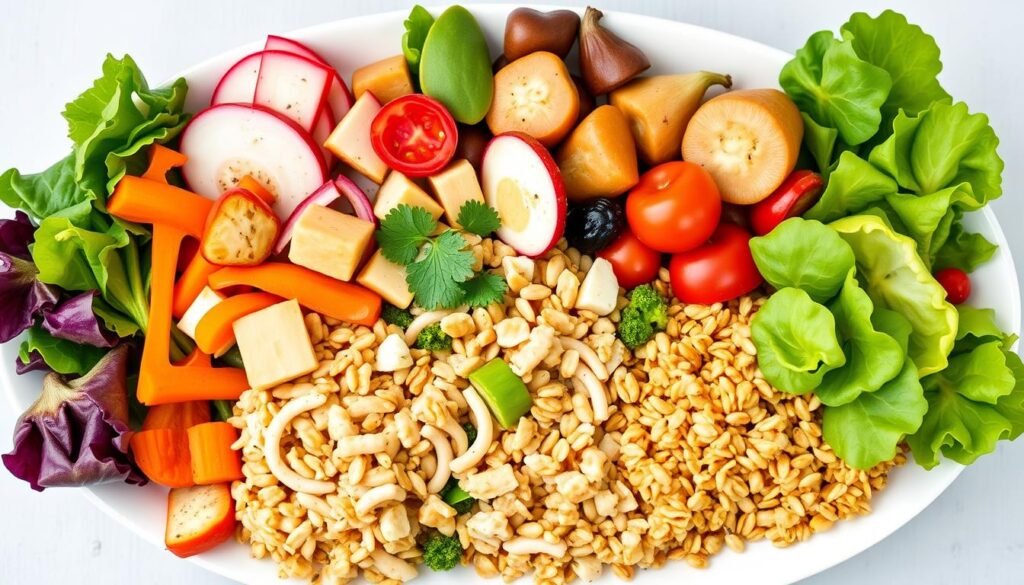
A 1700 calorie diet is better than very low-calorie diets. It lets you eat enough to support your daily activities and exercise. Eating 1,200 to 1,500 calories a day is often seen as low for losing weight. But 1700 calories is just right to help you lose weight without feeling too hungry.
| Guideline | Recommendation |
|---|---|
| Fiber intake | 14 grams per 1,000 calories |
| Daily sugar limit for women | <100 calories (6 tsp) |
| Daily sugar limit for men | <150 calories (9 tsp) |
By following these tips and eating whole foods, you can do well on a 1700 calorie diet. You’ll see better health and lasting weight loss.
Crafting a Nutritious 1700 Calorie Meal Plan
Creating a 1700 calorie meal plan is key for a healthy lifestyle and weight management. Focus on foods rich in nutrients and control your portions. This way, your body gets what it needs without going over your calorie limit.
Incorporating a Variety of Nutrient-Dense Foods
When planning your 1700 calorie diet, choose a variety of foods. Include whole grains, lean proteins, fruits, vegetables, and healthy fats. Make sure to add these to your meals and snacks every day:
- Whole grains: Brown rice, quinoa, whole wheat bread, and oatmeal
- Lean proteins: Chicken, fish, tofu, legumes, and low-fat dairy products
- Fruits and vegetables: Berries, leafy greens, sweet potatoes, and cruciferous vegetables
- Healthy fats: Avocados, nuts, seeds, and olive oil
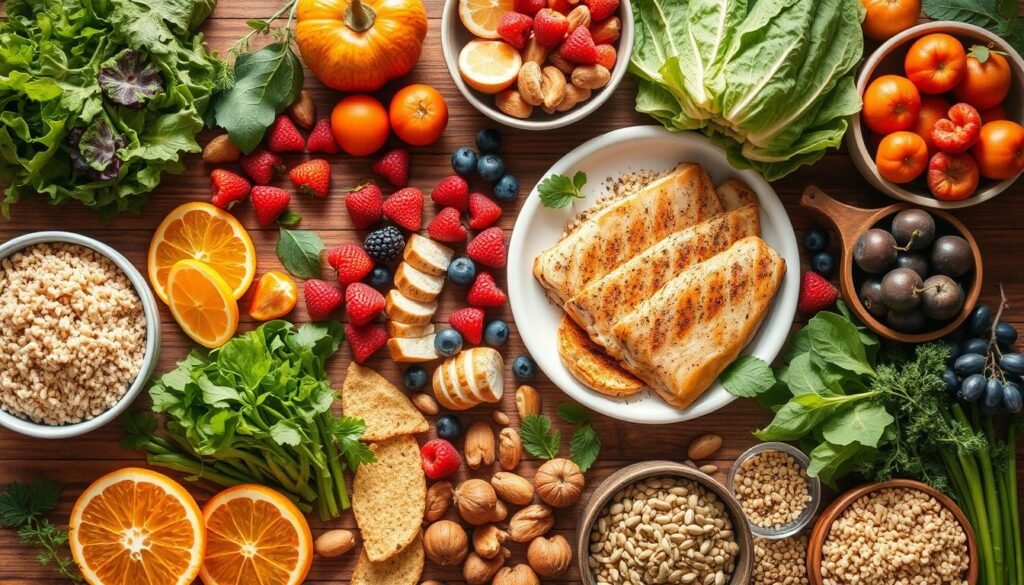
Balanced Meals and Snacks
To keep your energy up, aim for balanced meals and snacks. A 1700 calorie diet might look like this:
| Macronutrient | Daily Amount |
|---|---|
| Protein | 150g |
| Carbohydrates | 150g |
| Fat | 50g |
Distribute these nutrients evenly in your meals and snacks. This helps keep your blood sugar stable and prevents hunger or cravings.
Portion Control and Mindful Eating
Controlling your portions is vital to stay within your 1700 calorie limit. Use measuring tools or visual cues for correct serving sizes. Also, practice mindful eating by:
- Paying attention to your hunger and fullness cues
- Eating slowly and savoring each bite
- Avoiding distractions while eating, such as watching TV or working
Mindful eating is not about restriction; it’s about enjoying food while being present and aware.
By focusing on nutrient-dense foods, balanced meals, and mindful eating, you can create a sustainable 1700 calorie meal plan. This plan supports your health and wellness goals.
Sample Meal Ideas for a 1700 Calorie Diet
Creating a 1700 calorie meal plan is key for a healthy lifestyle and weight control. By eating a variety of nutritious foods, your body gets the nutrients it needs. Here are some meal ideas for your 1700 calorie diet.
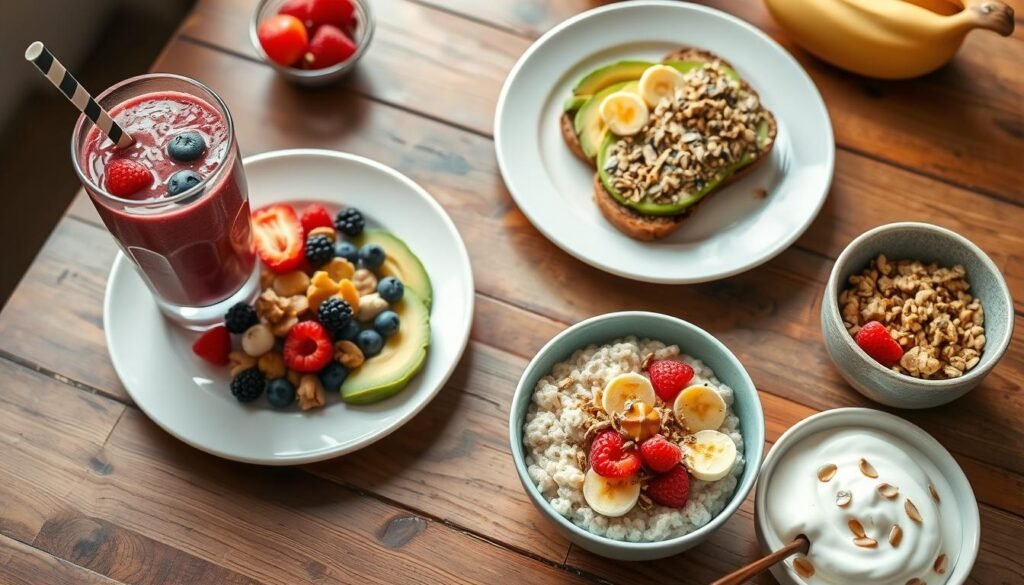
Healthy Breakfast Options
Begin your day with a healthy breakfast. Here are some great options:
- Oatmeal with fresh berries, chopped nuts, and honey
- Scrambled eggs with spinach, tomatoes, and whole-grain toast
- Greek yogurt parfait with granola and fruit
- Whole-grain English muffin with almond butter and banana
Satisfying Lunch Recipes
Make your lunch exciting and filling with these recipes:
- Grilled chicken salad with mixed greens, quinoa, avocado, and vinaigrette
- Whole-grain wrap with hummus, turkey, cucumber, and lettuce
- Vegetable soup with a small salad and fruit
- Tuna salad sandwich on whole-grain bread with carrot sticks and cherry tomatoes
Nutritious Dinner Ideas
Finish your day with a healthy and tasty dinner:
- Baked salmon with Brussels sprouts and sweet potato wedges
- Vegetarian chili with beans, vegetables, and low-fat cheese
- Grilled lean steak with steamed broccoli and brown rice
- Stir-fried tofu and vegetables over cauliflower rice
Smart Snack Choices
Snacking smartly keeps your energy up and prevents overeating. Here are some good snack options:
- Apple slices with peanut butter
- Carrot and celery sticks with hummus
- Hard-boiled egg and almonds
- Air-popped popcorn with herbs or spices
| Meal | Calories | Protein (g) | Carbs (g) | Fat (g) |
|---|---|---|---|---|
| Breakfast | 400-500 | 20-30 | 50-70 | 10-20 |
| Lunch | 400-500 | 25-35 | 40-60 | 15-25 |
| Dinner | 500-600 | 30-40 | 50-70 | 20-30 |
| Snacks | 200-300 | 5-10 | 30-40 | 5-10 |
Following a 1700 calorie meal plan means listening to your body and adjusting as needed. Drinking 9 cups of water a day for women and 13 cups for men helps your health and weight management.
The key to a successful 1700 calorie diet is finding meals and snacks you enjoy. They should also provide the nutrients your body needs to stay healthy and support your wellness goals.
Tips for Successfully Following a 1700 Calorie Meal Plan
Starting a 1700 calorie meal plan can help you lose weight and feel better. To do well, plan your meals, prepare them ahead, stay hydrated, and make good choices when eating out.
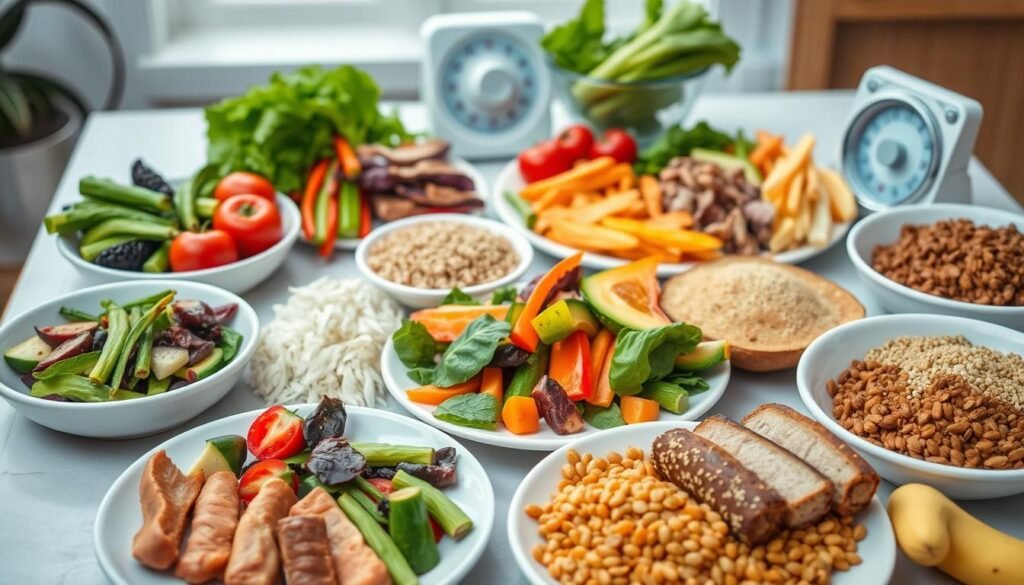
Meal Planning and Preparation
Planning and preparing meals in advance is key to a 1700 calorie diet. Spend some time each week on meal planning and prep. This way, you’ll have healthy, portioned meals ready to go. Here are some tips:
- Create a weekly menu that fits your calorie and nutritional needs
- Make a grocery list to get all the ingredients you need
- Prep ingredients or cook meals early to save time during the week
- Use a food diary or app to track your calories and nutrients
Here’s a sample meal plan for a 1700 calorie diet:
| Meal | Calories | Protein (g) | Carbs (g) | Fat (g) |
|---|---|---|---|---|
| Breakfast | 400 | 20 | 50 | 15 |
| Lunch | 450 | 30 | 40 | 20 |
| Dinner | 550 | 35 | 50 | 25 |
| Snacks | 300 | 15 | 40 | 10 |
| Total | 1700 | 100 | 180 | 70 |
Staying Hydrated
Drinking enough water is important for your health and can make you feel full. Try to drink 8-10 glasses of water a day. You can also drink herbal tea or low-calorie flavored water. Drinking water before, during, and after meals helps with digestion and prevents overeating.
Dining Out on a 1700 Calorie Diet
Eating out on a 1700 calorie diet can be tough, but it’s doable. Be careful of portion sizes and calorie-rich foods when dining out. Here are some tips:
- Look up menus and nutrition info before you go
- Choose grilled, baked, or roasted proteins instead of fried or breaded ones
- Go for salads with dressing on the side or vegetable-based sides
- Share entrees or take half of your meal home
By planning meals, prepping, staying hydrated, and making smart choices when eating out, you can stick to a 1700 calorie diet. This will help you reach your health and weight goals.
Adapting the 1700 Calorie Meal Plan to Your Lifestyle
Starting a 1700 calorie meal plan can help you reach your health goals. But, it’s key to make it fit your lifestyle, dietary restrictions, and preferences. By tweaking the plan, you can make it work for you and enjoy it.
Think about these things when adjusting the 1700 calorie meal plan:
- Your daily routine and schedule
- Any food allergies or intolerances
- Cultural or religious dietary guidelines
- Personal taste preferences and favorite foods
Here’s a table to show how you can tailor the 1700 calorie meal plan:
| Dietary Approach | Breakfast | Lunch | Dinner |
|---|---|---|---|
| Vegetarian | Tofu scramble with spinach and tomatoes | Quinoa and black bean salad | Lentil and vegetable curry |
| Gluten-free | Overnight oats with almond milk and berries | Grilled chicken salad with mixed greens | Baked salmon with sweet potato and broccoli |
| Low-carb | Spinach and feta cheese omelette | Tuna salad lettuce wraps | Grilled steak with roasted vegetables |
Finding a balance is the secret to success. Try different foods and meal times until you find what works for you.
The best diet is the one that you can stick to long-term while nourishing your body and supporting your overall health.
By customizing the 1700 calorie meal plan, you’re setting yourself up for success. You’ll be on your way to a healthier, happier you.
Overcoming Challenges and Obstacles
Starting a 1700 calorie meal plan can be tough. You’ll face challenges and obstacles. But, with the right mindset and strategies, you can beat these hurdles and reach your health goals.
Managing Cravings and Temptations
Cravings and temptations are common when you start a new diet. It’s normal to want foods that aren’t part of your 1700 calorie plan. Here are some tips to help:
- Distract yourself with a favorite activity, such as reading, walking, or calling a friend
- Reach for a healthy snack, like fresh fruits, vegetables, or a small handful of nuts
- Practice mindful eating techniques, savoring each bite and focusing on the flavors and textures of your food
Staying Motivated and Consistent
Staying motivated and consistent is another challenge. Here are some ways to stay on track:
- Set realistic, achievable goals for yourself and celebrate your progress along the way
- Find an accountability partner or support group to share your journey with
- Keep a food journal to track your intake and identify areas for improvement
- Remind yourself of the benefits of healthy eating, such as increased energy, better sleep, and improved overall well-being
Success on a 1700 calorie meal plan is about progress, not perfection. If you have setbacks, don’t get discouraged. Just focus on getting back on track with your next meal or snack.
“Success is the sum of small efforts, repeated day in and day out.” – Robert Collier
| Challenge | Solution |
|---|---|
| Cravings and temptations | Distract yourself, choose healthy snacks, practice mindful eating |
| Staying motivated and consistent | Set realistic goals, find support, track progress, focus on benefits |
By using these strategies and staying positive, you can overcome challenges on a 1700 calorie meal plan. With dedication and hard work, you’ll reach your health and wellness goals.
Tracking Progress and Making Adjustments
Starting a 1700 calorie meal plan means keeping an eye on your progress. Tracking your weight loss, body measurements, and how you feel is key. It shows if your diet changes are working.
It’s also important to watch your energy levels all day. Feeling tired or sluggish might mean you need to adjust your nutrient intake. Make sure your meals have the right mix of protein, healthy fats, and carbs.
Checking in regularly helps you see what needs tweaking. Keeping a food diary can help you track calories and nutrients. It also helps you notice any eating habits that might slow you down.
A well-balanced 1,700-calorie meal plan should include carbohydrates (45-65% of total calories, 191-276 grams per day, 765-1,105 calories), proteins (10-35% of total calories, 43-149 grams per day, 170-595 calories), and fats (20-35% of total calories, 38-66 grams per day, 340-595 calories).
If you’re not seeing the results you want, it’s okay to tweak your meal plan. You might need to change your calorie intake, add more nutrient-rich foods, or adjust your portion sizes.
| Progress Tracking Method | Frequency |
|---|---|
| Weight measurement | Once a week |
| Body measurements | Every 2-4 weeks |
| Energy levels assessment | Daily |
| Food diary | Daily |
| Progress photos | Monthly |
Remember, losing weight slowly is better for keeping it off. By tracking your progress and making smart changes to your 1700 calorie meal plan, you’ll get closer to your health and fitness goals. And you’ll do it with a diet that’s both balanced and nourishing.
Conclusion
Following a 1700 calorie meal plan can help you reach your health and weight goals. Focus on foods rich in nutrients and control your portions. This way, you’ll enjoy eating while staying healthy.
Eating a variety of fruits, veggies, lean proteins, and whole grains is key. It helps you stay balanced and manage your weight.
Building healthy eating habits takes time and effort. Listen to your body and make choices that feel right. Drinking water, sleeping well, and managing stress are also important for your health.
Start celebrating your small victories on this journey. Every change you make can lead to big health improvements. Stay positive and keep working towards your goals. A 1700 calorie meal plan is a great step towards a healthier life.
FAQ
What is a 1700 calorie meal plan?
A 1700 calorie meal plan is a diet that helps you lose weight and stay healthy. It includes three meals and two snacks a day. This plan gives you the nutrients you need while keeping calories low.
Who can benefit from following a 1700 calorie meal plan?
The 1700 calorie diet is great for those starting out or who don’t move much. It’s a gentle way to lose weight without strict rules. It fits many lifestyles and diets.
What is the recommended macronutrient balance for a 1700 calorie diet?
For a 1700 calorie diet, aim for 45-65% carbs (191-276 grams), 20-35% fats (38-66 grams), and 10-35% protein (43-149 grams). This balance ensures you get enough nutrients while losing weight.
What are some healthy breakfast options for a 1700 calorie diet?
Healthy breakfasts for a 1700 calorie diet include oatmeal with fruit and nuts, scrambled eggs with whole-grain toast and avocado, or a Greek yogurt and berry smoothie. Choose foods that are full of nutrients to start your day well.
How can I stay motivated and consistent while following a 1700 calorie meal plan?
To stay on track, set achievable goals and track your progress. Celebrate your wins. Find healthy ways to deal with cravings, like distracting yourself or choosing a nutritious snack.
Can I customize the 1700 calorie meal plan to fit my dietary restrictions or preferences?
Yes, you can tailor the 1700 calorie meal plan to suit your needs. Pick foods you like and that fit your dietary needs, like vegetarian or gluten-free options. The goal is to eat well and stay within the calorie limit.
How can I track my progress on a 1700 calorie meal plan?
To track your progress, use a scale, measuring tape, or body composition analysis. Notice how you feel, like your energy and overall health. Keep a food diary or use a nutrition app to watch your calorie intake.
What should I do if I’m not seeing the desired results or feeling overly hungry on a 1700 calorie diet?
If you’re not seeing results or feeling very hungry, adjust your meal plan. Consider getting help from a dietitian or healthcare provider. Remember, building healthy eating habits takes time and patience.
How Was Your Experience? Share Your Review!
There are no reviews yet. Be the first one to write one.

